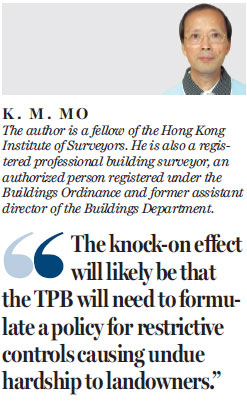Property judgment's far-reaching implications for local developers
Updated: 2016-10-14 07:19
By K. M. Mo(HK Edition)
|
|||||||
K. M. Mo writes that the ruling on the Hysan case may lead to the TPB introducing measures to address its administrative flaws which may further result in lengthening its vetting process
The recent judgment of the Court of Final Appeal (CFA) on a case between Hysan Development and the Town Planning Board (TPB) potentially has far-reaching implications regarding future developments. In the worst scenario, it could delay urban development.
The appeal was related to protection of private property rights conferred by Articles 6 and 105 of the Basic Law regarding the planning restrictions imposed by the TPB.
The CFA ruled that Articles 6 and 105 of the Basic Law are relevant on restrictions imposed in town plans and encroached upon the property rights of landowners.

Article 6 of the Basic Law says the Hong Kong SAR will protect the right of private ownership of property in accordance with law. Article 105, inter alia, states that the HKSAR should, in accordance with law, protect the rights of individuals and legal persons to the acquisition, use, disposal and inheritance of property and their right to compensation for lawful deprivation of their property.
The court ruled that in considering the town planning restrictions and property rights under the Basic Law, a reasonable balance should be struck between the social benefits and the encroachment of property rights, particularly when it would place a harsh burden on the property owners.
In assessing the permissible extent of the incursion into the protected property right, two standards have been advocated. The first is to check whether the intruding measure is "no more than necessary" and the second is to check if the encroaching measure is "manifestly without reasonable foundation", in which case the court would accept the latter one.
In an earlier appeal the Court of Appeal (CA) ordered the TPB to reconsider its decisions because of flaws in the administrative process. This resulted in the appellant not being given a fair hearing and its representations not being properly considered.
The above judgments by the CFA and CA have implications concerning the property rights of landowners affected by new or amended town plans as well as the administrative process.
The CFA has confirmed that landowners' property right is protected by Articles 6 and 105 of the Basic Law. While that particular case was related to building height limit, the loss or depreciation of development intensity arising from other planning controls such as restrictions on use and plot ratio will also be covered by the said articles.
It follows that for the imposition of any restriction in a town plan, whether it concerns a new town plan or amendments to an approved town plan, the TPB must carefully evaluate the social benefits against the landowners' possible hardship. The TPB should also satisfy itself that the proposed controls are not manifestly without reasonable foundation.
The knock-on effect will likely be that the TPB will need to formulate a policy for restrictive controls causing undue hardship to landowners.
While compensation was not deliberated in the court, it is likely that claims under Article 105 of the Basic Law will be raised for loss of development value (e.g. reduction in prime shopping space at ground level resulting from requirements for the setback of the building) arising from the controls in the town plan.
Previously, payment of compensation arising from the imposition of restrictions under the town plan has never been an issue. Now, however, following the judgment on the application of Article 105 of the Basic Law, the TPB may wish to consider whether a mechanism regarding compensation should be incorporated in the Town Planning Ordinance (TPO).
In the past the Building Authority (BA) has invoked its discretionary powers, apparently on the recommendation of the Planning Department (PlanD), in rejecting development plans complying with the town plan controls. This is because the proposed building differed in height or use from buildings in the vicinity.
Following the recent judgment, the BA will need to justify, unless on safety grounds, why it is not unreasonable to arrive at its discretionary decision. Where discretion is exercised because of PlanD's persuasion, then PlanD will need to justify why it is proper to make use of the Buildings Ordinance, instead of the town plan made under the TPO, to bridge an apparent town planning gap.
To tackle the administrative flaws, the TPB will need to address the long hours of meeting time which may render its members unable to concentrate on the important issues involved. The TPB will also need to address the problem of members participating in the decision-making process but not sitting throughout the board meeting.
The TPB will also need to ensure its members get sufficient time to digest the bulky papers/submissions before the board meeting.
Perhaps the appointment of alternate TPB members may be a way to release the burden of work on current TPB members.
Finally, a word of caution: Whatever measures are introduced to address the administrative flaws, they may result in lengthening the vetting process unless additional resources are channeled to the TPB.
(HK Edition 10/14/2016 page1)